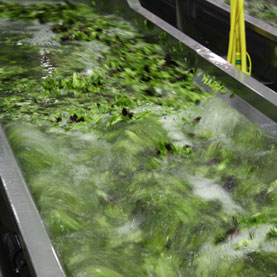My friends at the Academy of Nutrition and Dietetics are at it again. Last week they recycled a press release on the dangers of reusable bags that was full of holes, This week Sarah Kriegar of The Academy decided to remind folks that washing pre-washed leafy greens is a good idea. 
“Fruits and vegetables are an important part of a healthy eating plan, and should fill half of your plate, but just like any food product, extra precautions should be taken to reduce the risk of food poisoning,” said Sarah Krieger, a registered dietitian and academy spokeswoman, in a statement.
She said (among other things -ben):
– Buy loose produce rather than pre-packaged, but if you do buy packaged lettuce or carrots or other items, wash them even if they say “ready to eat.”
I’d like to see what data The Academy has that shows this recommendation would result in risk-reduction.
Washing pre-washed leafy greens in the home isn’t going to accomplish further risk-reduction than what was applied at processing; tight attachment or internalization of the target pathogens are likely for whatever is left when it gets to someones kitchen.
A review paper published in Food Protection Trends in 2007 contained guidelines developed by a national panel of food safety folks and concluded:
"… leafy green salad in sealed bags labeled ‘washed’ or ‘ready-to-eat’ that are produced in a facility inspected by a regulatory authority and operated under cGMPs, does not need additional washing at the time of use unless specifically directed on the label.”
The panel also advised that additional washing of ready-to-eat green salads is not likely to enhance safety.
“The risk of cross contamination from food handlers and food contact surfaces used during washing may outweigh any safety benefit that further washing may confer."
A table of leafy green-related outbreak is available at http://bites.ksu.edu/leafy-greens-related-outbreaks. I’m not sure there’s any data out there that shows washing would have been a protective step for any of the outbreaks.
The merits of washing produce at home are debatable – many papers show somewhere around a 1-log reduction of pathogens from washing produce with no difference whether the fruit or vegetable was washed with water or some sort of sanitizer. A ten-fold reduction is okay if there isn’t much pre-home contamination, but washing as a kill step sucks and is really more about increasing quality(removing grit). Effective risk reduction actions for fresh produce are more likely found in production, processing and food service preparation (where contamination often occurs) – not in home kitchens.
